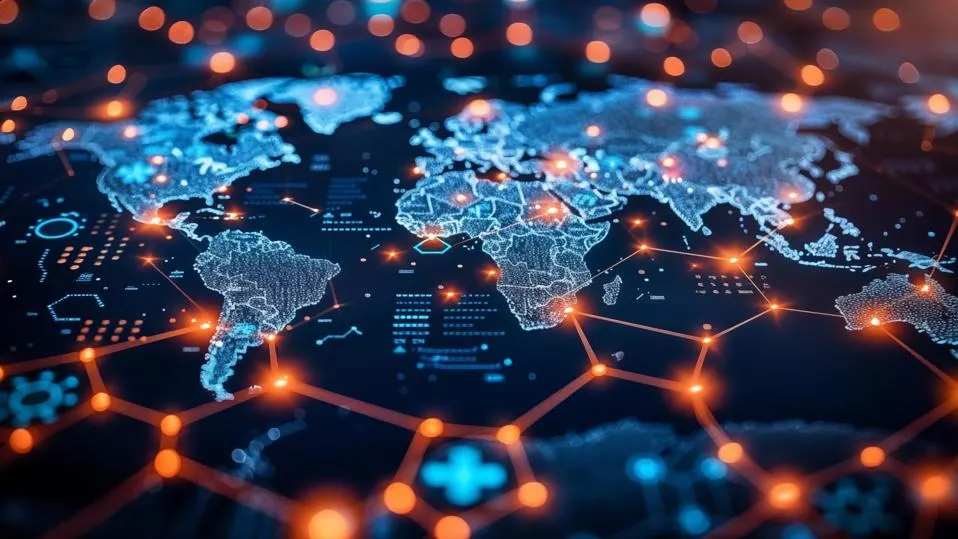The Geopolitics Of AI
30 September 2024
Artificial intelligence (AI) is likely to be one of the most transformative technologies of the century. This means that it’s rapidly becoming an important factor in international politics.
Nations preparing (and, in many cases, already deploying) AI tools for security, intelligence, international relations, and trade are keenly aware of their potential to influence global power dynamics.
In fact, its impact is predicted to be so dramatic that the highly influential RAND think tank reports, “Nations across the globe could see their power rise or fall depending on how they harness and manage the development of AI.”
We’ve already seen governments impose restrictions on the export of advanced AI technologies to rival nations, usually citing national security concerns. And the ongoing clamor for control over global semiconductor supply chains is another indicator of the high stakes of this emerging AI arms race.

AI And National Security
From autonomous warfare to intelligent cyber defense, nations with an upper hand in the AI race are building an advantage in national security.
For proof of this, we can look to the Ukraine conflict, where technology developed by advanced Western nations is helping Ukraine hold off an invasion by its far larger neighbor.
But AI’s influence on security extends beyond the battlefield. With cyberattacks becoming more numerous, damaging and difficult to detect, cyber defense experts increasingly rely on AI to provide protection.
Additionally, AI is used for surveillance to detect and prevent international crime, espionage and terrorism. Of course, using controversial technologies such as facial recognition for these purposes also raises important questions about civil rights and privacy.
In recent years, this has led to widespread concern over the extent to which technology created and potentially controlled by competing governments has been integrated into national infrastructure.
These examples all serve to illustrate ways in which AI superiority is increasingly creating competitive advantages for countries, states and global coalitions when it comes to geopolitics.
Those in power will face difficulty navigating the fine line between leveraging its potential and ensuring that principles of human rights and ethics are upheld.
International Trade And Business
In recent years, we’ve seen that AI's role in international trade and economics is just as globally significant as its impact on military and security issues.
The potential advantages created by AI have led to new forms of international tensions. These have often been focused on potential sanctions and protectionist measures taken by nations seeking to preserve or increase their own competitive advantage.
A clear example is the restrictions on the export of advanced AI chips and semiconductor technology. In both Western nations and China, there have been concerted efforts to avoid using foreign-made technology.
Although largely unspoken, the concern is that in the event of worsening international relations, no country wants to find itself reliant on technology provided by hostile competitors. While the most commonly cited reason for these restrictions and trade embargos is national security, maintaining an economic advantage is likely to be considered equally important.
Specific mention has to be given to the precarious role played by countries such as Taiwan and South Korea—which are home to advanced semiconductor manufacturers like TSMC and Samsung. Both countries are faced with the challenge of maintaining trade relationships with the West and with China while also protecting their own economic interests.
While the US and China are widely considered to be the leaders in the development and ownership of AI technology, researchers at Goldman Sachs have identified a number of “swing states” where a significant stake in the international AI market is likely to impact global politics. These include the UK, UAE, Israel, Japan, the Netherlands, South Korea, Taiwan and India.
Meanwhile, measures introduced through legislation such as the EU AI Act have also been likened to a form of protectionism. These new laws make it possible to restrict access to specific geographic markets if AI service providers decline to share data, details about how their technology works, or comply with local legislation.
Take Brazil’s recent ban of X (formerly Twitter), for example. The legal battle, sparked by concerns over the spread of disinformation on the platform, highlights the fact that nation-states are increasingly aware of the potential of digital networks to shape political discourse or create political instability. It’s possible we will see more states beginning to exercise their authority as they attempt to regulate this.
Global Collaboration Or Techno-Nationalism?
These examples demonstrate the complex and precarious impact of the AI revolution on issues of geopolitics.
We’ve already seen that it can be the trigger for protectionist measures as individual states seek to control its impact on their societies while also leveraging it for security or economic advantages.
This illustrates that the need for international collaboration has never been more urgent. AI holds huge potential for helping solve some of the world’s most pressing challenges, from tackling climate change to improving healthcare. However, these efforts could potentially be undermined if nations and states refuse to set aside political or economic rivalries.
Protectionist measures—or techno-nationalism—threaten to stifle the flow of ideas, collaboration and innovation that are essential if AI is to make the world a better place.
Sure, competition can breed innovation, too, when it’s healthy and fair. So, the path ahead will involve a blend of rivalry and cooperation. Initiatives such as the AIxGEO project, led by the Cambridge University Bennet Institute For Public Policy, aim to develop frameworks for this type of “co-opetition.”
We must hope that leaders are ready to recognize that the most pressing challenges of the AI age, such as the proliferation of cyberattacks and the spread of disinformation – can only be solved collaboratively and by transcending international borders.
Related Articles
The 6 Education Trends That Will Shape Learning And Skills In 2026
By now, “smart” versions exist of just about every home appliance, gadget and gizmos we can think of. However, manufacturers continue[...]
The Big Ideas Shaping CES 2026 And What They Mean For The Future Of Technology
By now, “smart” versions exist of just about every home appliance, gadget and gizmos we can think of. However, manufacturers continue[...]
Why CES 2026 Signals The End Of ‘AI As A Tool’
By now, “smart” versions exist of just about every home appliance, gadget and gizmos we can think of. However, manufacturers continue[...]
Letting AI Browse The Web For You Sounds Great Until It Goes Wrong
By now, “smart” versions exist of just about every home appliance, gadget and gizmos we can think of. However, manufacturers continue[...]
7 Legal Tech Trends That Will Reshape Every Business in 2026
By now, “smart” versions exist of just about every home appliance, gadget and gizmos we can think of. However, manufacturers continue[...]
8 Skills You Need To Manage The New AI Agent Workforce
By now, “smart” versions exist of just about every home appliance, gadget and gizmos we can think of. However, manufacturers continue[...]
Sign up to Stay in Touch!
Bernard Marr is a world-renowned futurist, influencer and thought leader in the fields of business and technology, with a passion for using technology for the good of humanity.
He is a best-selling author of over 20 books, writes a regular column for Forbes and advises and coaches many of the world’s best-known organisations.
He has a combined following of 4 million people across his social media channels and newsletters and was ranked by LinkedIn as one of the top 5 business influencers in the world.
Bernard’s latest book is ‘Generative AI in Practice’.










Social Media